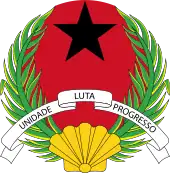| English: This Is Our Well Beloved Motherland | |
|---|---|
National anthem of Guinea-Bissau, Former national anthem of Cape Verde | |
| Lyrics | Amílcar Cabral, 1963 |
| Music | Xiao He, 1963 |
| Adopted | 1974 |
| Relinquished | 1996 (Cape Verde) |
| Audio sample | |
| |
"Esta É a Nossa Pátria Bem Amada" (English: "This Is Our Well Beloved Motherland") is the national anthem of Guinea-Bissau. Written in 1963 by Amílcar Cabral (1924–1973) and composed by Xiao He (1918–2010), it was adopted upon independence from Portugal in 1974.
It was also the national anthem of Cape Verde, a legacy of both countries' joint independence, until 1996, when a new anthem ("Cântico da Liberdade") was adopted by Cape Verde.
History
The anthem was written by independence leader of Guinea-Bissau and Cape Verde Amílcar Cabral. Cabral, a Bissau-Guinean son of Bissau-Guineans and Cape Verdeans, was the leader of the African Party for the Independence of Guinea and Cape Verde (PAIGC).[1]
In 1963, a delegation from then Portuguese Guinea visited China and heard music by composer Xiao He. Cabral asked Xiao to compose a piece that would inspire his people in their struggle for independence.[2][3] Set to a 1963 poem by Cabral, the piece was later adopted by Guinea Bissau and Cape Verde as the national anthem upon their independence from Portugal in 1974.[3][4]
In the 1990s, after the African Party for the Independence of Cape Verde allowed multi-party rule, it was decided that Cape Verde should adopt its own national symbols, including a flag and anthem.[1] A new anthem, "Cântico da Liberdade", was adopted in 1996.[4]
Lyrics
| Portuguese original[3][5] | IPA transcription[lower-alpha 1] | English translation |
|---|---|---|
I |
1 |
I |
Notes
- ↑ See Help:IPA/Portuguese and Guinean Portuguese.
References
- 1 2 Mourão, Daniele Ellery (April 2009). "Guiné-Bissau e Cabo Verde: identidades e nacionalidades em construção". Pro-Posições (in Portuguese). 20: 83–101. doi:10.1590/S0103-73072009000100006. ISSN 1980-6248.
- ↑ Agency, Central Intelligence (2013-01-04). The World Factbook 2012-13. U.S. Executive Office of the President. p. 311. ISBN 978-0-16-091142-2.
- 1 2 3 Berg, Tiago José (2012-11-26). Hinos de todos os países do mundo. Panda Books. p. 178. ISBN 9788578881917.
- 1 2 Diario, Nós (16 December 2016). "Literatura para a militância nacional: hinos da lusofonia". Nós Diario (in Galician). Retrieved 2022-01-24.
- ↑ Augel, Moema Parente (2007). O desafio do escombro: nação, identidades e pós-colonialismo na literatura da Guiné-Bissau (in Brazilian Portuguese). Editora Garamond. p. 422. ISBN 978-85-7617-134-8.
External links
- Guinea-Bissau: Esta É a Nossa Pátria Bem Amada - Audio of the national anthem of Guinea-Bissau, with information and lyrics (archive link)
